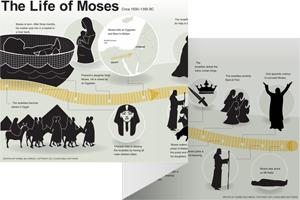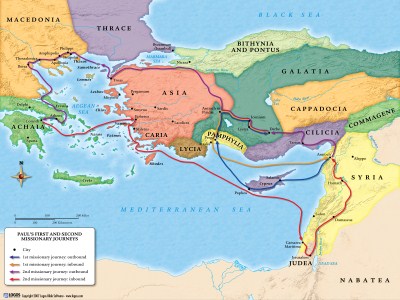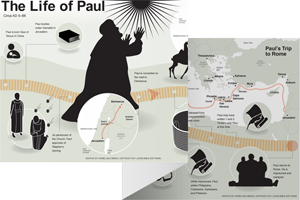3:1–9 These verses contain further warnings about the false teachers. The list of vices in 2 Tim 3:2–4 serves to contrast the selfish and corrosive behavior of false teachers with the conduct expected of God’s people. |
3:1 last days Refers to the period of time before Christ returns to establish His kingdom. Christians in the nt period believed they were already living in the last days (e.g., 1 Cor 10:11; 1 Pet 1:20; Heb 1:2).
3:5 form of godliness Someone who is godly only in outward appearance (see note on 1 Tim 2:2). Such people look righteous but are only religious, not actually living according to God’s standards. They promote foolish controversies and ascetic practices that deny the power of godliness for true transformation.
power The Greek term, dynamis, here refers to Timothy’s ability to continue in the ministry Christ gave to him through Paul despite hardship (2 Tim 1:7–11). Compare 1 Cor 4:20 and note.
The word dynamis means “power.” In the Gospels, it often refers to acts of power like miracles (Mark 6:2). In Acts, Jesus tells His disciples that they will receive power when the Holy Spirit comes upon them (Acts 1:8). Elsewhere, dynamis refers to God’s power seen in salvation (Rom 1:16) as well as the power that comes from God to help believers live the Christian life. In 2 Timothy, power enables Timothy to continue ministering effectively and endure suffering. |
3:6 foolish women Refers to women—probably including some of the younger widows (1 Tim 5:11–16)—who apparently were overwhelmed by guilt from their past sins and overly eager to hear teaching of any substance. False teachers take advantage of these women because of their desire for religious education. These women likely paid the teachers for their religious education (compare 1 Tim 6:3–10).
3:7 always learning These women learn from false teachers whose instruction cannot yield a knowledge of the gospel or lead to godly living. Such instruction stands in contrast to Scripture, which makes a person wise regarding salvation via Christ Jesus (2 Tim 3:15).
knowledge of the truth See note on 1 Tim 2:4. In the Pastoral Letters, Paul associates a knowledge of the truth with salvation because of the danger of false instruction (1 Tim 2:4; 2 Tim 2:25; Titus 1:1).
3:8 Jannes and Jambres According to Jewish legend, Jannes and Jambres were the names of the magicians (unnamed in the biblical narrative) who opposed Moses and imitated the miraculous signs of Aaron before Pharaoh (Exod 7:8–22). Versions of this legend occur in the Jewish text commonly called Jannes and Jambres and the text Targum Pseudo-Jonathan. Paul references these men to warn Timothy about the threat of false teachers. Such people will oppose Timothy and even imitate godliness (i.e., have an outward appearance of godliness), but they will not have knowledge of the gospel or possess any power that transforms lives.
(unnamed in the biblical narrative) who opposed Moses and imitated the miraculous signs of Aaron before Pharaoh (Exod 7:8–22). Versions of this legend occur in the Jewish text commonly called Jannes and Jambres and the text Targum Pseudo-Jonathan. Paul references these men to warn Timothy about the threat of false teachers. Such people will oppose Timothy and even imitate godliness (i.e., have an outward appearance of godliness), but they will not have knowledge of the gospel or possess any power that transforms lives.
Moses God called on Moses to deliver His people from slavery in Egypt (Exod 3:10).
to deliver His people from slavery in Egypt (Exod 3:10).
3:9 their folly Paul assures Timothy that these religious peddlers will be shamed for their lack of understanding, like the Egyptian magicians who opposed Moses (Exod 8:18–19; 9:11).
3:10–17 Paul presents his conduct as an example of faithful service to God (2 Tim 3:10–13). He then encourages Timothy to remain strong in the faith, using God’s gift of Scripture to minister effectively (vv. 14–17). |
3:10 teaching Refers to the instruction Paul passed down to Timothy (2:2). Paul connects his instruction and his lifestyle, listing the virtues that define true godliness, not just a form of it (see vv. 5; 1 Tim 4:12). In doing so, he contrasts himself with the false teachers just described (2 Tim 3:5).
way of life Encompasses Paul’s entire ministry, which he considers worthy of imitation (1 Cor 4:16).
3:11 in Antioch, in Iconium, and in Lystra Paul visited these cities during his first missionary journey (Acts 14:1–28). In Pisidian Antioch, opponents drove Paul out of the city (Acts 13:50). In Iconium,
opponents drove Paul out of the city (Acts 13:50). In Iconium, they tried to stone him (Acts 14:5–6); in Lystra,
they tried to stone him (Acts 14:5–6); in Lystra, they finally succeeded (Acts 14:19–20).
they finally succeeded (Acts 14:19–20).
3:12 will be persecuted Those who are godly (i.e., true Christians, as opposed to false teachers) should expect persecution (Acts 14:2; 1 Thess 3:4; Phil 1:29). Jesus instructed His disciples similarly (Matt 10:22–23; Luke 21:12).
(Acts 14:2; 1 Thess 3:4; Phil 1:29). Jesus instructed His disciples similarly (Matt 10:22–23; Luke 21:12).
3:14 from whom you learned Probably refers to Timothy’s grandmother, mother, and Paul. Their way of life and their source of teaching (i.e., the Scriptures) motivates Timothy to remain faithful.
3:15 childhood In Jewish tradition, boys received instruction in Torah beginning at age five.
holy writings The Greek phrase used here, hiera grammata, refers to the ot.
 The Formation of the Old Testament
The Formation of the Old Testament
to make you wise An expression meaning “to instruct you.” In this context, salvation is the subject of instruction. Scripture makes a person wise, but the instruction of false teachers leads to folly (2 Tim 3:9; 1 Tim 1:6–7; compare Prov 16:22).
wise for salvation Throughout the Pastoral Letters, Paul relates knowledge of the truth with salvation (see 1 Tim 2:4 and note). In this verse, Paul returns to “faith in Christ Jesus” as the means of salvation.
3:16 All scripture The Greek phrase used here, pasa graphē, may refer to the totality of Scripture or to every passage of Scripture.
inspired by God Paul uses the Greek term theopneustos here (meaning “God-breathed”) to assure Timothy that Scripture is, in fact, from God. Although God used people to produce the Scriptures (2 Pet 1:20–21), their ultimate origin is God. By contrast, the false teaching that Timothy opposed comes from evil forces who spread their doctrine through errant teachers (1 Tim 1:3–7; 4:1).
profitable Scripture is valuable because it corrects false teaching while building up believers to live godly lives.
 Theopneustos: Interpreting “God-Breathed”
Theopneustos: Interpreting “God-Breathed”
 The Formation of the New Testament
The Formation of the New Testament
teaching Timothy’s primary task in Ephesus (1 Tim 4:6, 13).
reproof To rebuke false teachers and admonish those who believe their teaching (e.g., 1 Tim 6:3–10).
correction To help believers grow in godly behavior.
training in righteousness Describes training in doing what is right or what is in accordance with godliness.
3:17 equipped for every good work Scripture is profitable because of this purpose (2 Tim 3:16). Paul reminds Timothy that Scripture helps believers fulfill the work of the ministry (4:1–5). It is therefore a gift to His people. God has not left Timothy or the believers in Ephesus to do good works on their own; He has provided them with Scripture and each other, all for doing good works in Christ Jesus (Eph 2:10; 2 Tim 2:21; Titus 3:1).

|
About Faithlife Study BibleFaithlife Study Bible (FSB) is your guide to the ancient world of the Old and New Testaments, with study notes and articles that draw from a wide range of academic research. FSB helps you learn how to think about interpretation methods and issues so that you can gain a deeper understanding of the text. |
| Copyright |
Copyright 2012 Logos Bible Software. |
| Support Info | fsb |
 Loading…
Loading…

 Dynamis
Dynamis 

